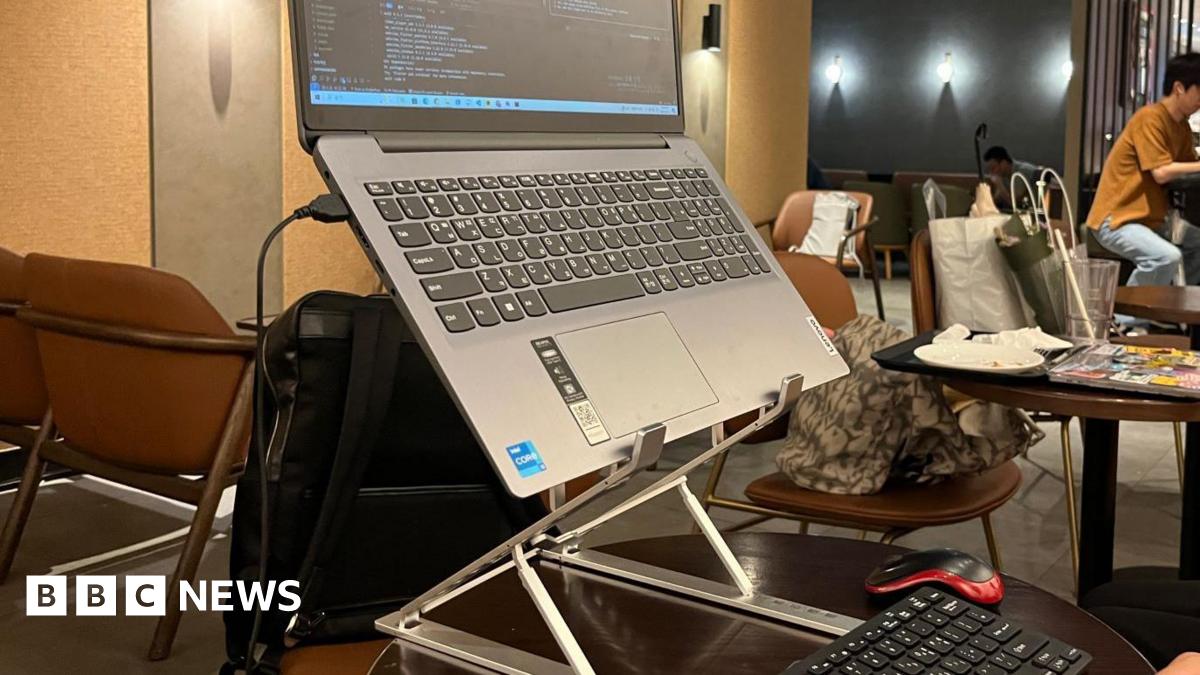South Korean Cafés Struggle With Students Overstaying: The Cagongjok Phenomenon

Welcome to your ultimate source for breaking news, trending updates, and in-depth stories from around the world. Whether it's politics, technology, entertainment, sports, or lifestyle, we bring you real-time updates that keep you informed and ahead of the curve.
Our team works tirelessly to ensure you never miss a moment. From the latest developments in global events to the most talked-about topics on social media, our news platform is designed to deliver accurate and timely information, all in one place.
Stay in the know and join thousands of readers who trust us for reliable, up-to-date content. Explore our expertly curated articles and dive deeper into the stories that matter to you. Visit Best Website now and be part of the conversation. Don't miss out on the headlines that shape our world!
Table of Contents
South Korean Cafés Struggle with Students Overstaying: The Cagongjok Phenomenon
South Korea's vibrant café culture is facing a brewing storm – not from fickle trends or rising coffee bean prices, but from a phenomenon known as cagongjok (카공족). This term, a portmanteau of "café" (카페) and "gongbu" (공부, meaning "study"), refers to students who occupy café seats for extended periods, often studying for hours on end, sometimes even all day. While cafés ostensibly welcome all customers, the cagongjok trend is creating a significant headache for business owners. This article delves into the challenges faced by South Korean cafés and explores potential solutions.
The Rise of the Cagongjok and its Impact
The cagongjok phenomenon isn't new, but it's become increasingly prominent in recent years. Several factors contribute to its rise:
- Limited Study Space: Many South Korean students lack adequate study spaces at home, particularly those living in smaller apartments common in larger cities like Seoul. Cafés offer a comfortable, often free, alternative with readily available Wi-Fi.
- Social Atmosphere: Studying in a café provides a sense of community and shared focus, which some students find beneficial. The ambient noise can also be less distracting than a quiet home environment for some.
- Convenience and Accessibility: Cafés are ubiquitous in South Korea, providing convenient and accessible study spots throughout the day and into the night.
However, this seemingly benign trend has significant downsides for café owners:
- Reduced Turnover: Students occupying seats for hours drastically reduces the number of customers a café can serve, impacting overall revenue.
- Strain on Resources: Extended stays put a strain on café resources, including electricity, water, and restroom facilities.
- Customer Dissatisfaction: Regular customers may become frustrated by the lack of available seating, leading to decreased patronage.
The Challenges Faced by Café Owners
Many café owners are struggling to find a balance between accommodating students and maintaining a profitable business. Directly asking students to leave can be awkward and potentially damage their reputation. Some cafés have attempted to implement time limits or minimum purchase requirements, but these measures often prove ineffective or unpopular. This delicate situation highlights the conflict between the needs of students and the sustainability of small businesses.
Potential Solutions and Future Outlook
Finding a sustainable solution requires a multi-pronged approach:
- Designated Study Spaces: Some cafés are exploring the creation of designated study areas with different pricing models, perhaps charging a small fee for extended use. This approach could incentivize longer stays while also generating additional revenue.
- Increased Collaboration: Collaboration between café owners and local universities or community centers could lead to the creation of dedicated student study spaces, alleviating pressure on cafes.
- Public Awareness Campaigns: Public awareness campaigns could encourage students to be more mindful of their café usage, promoting responsible study habits and respecting the needs of businesses.
The cagongjok phenomenon represents a complex social and economic issue. While it reflects a genuine need for accessible study spaces, it also presents a significant challenge to the viability of South Korean cafés. Finding solutions that benefit both students and business owners will be crucial for the future of both café culture and the academic landscape in South Korea. What solutions do you think are most effective? Share your thoughts in the comments below.

Thank you for visiting our website, your trusted source for the latest updates and in-depth coverage on South Korean Cafés Struggle With Students Overstaying: The Cagongjok Phenomenon. We're committed to keeping you informed with timely and accurate information to meet your curiosity and needs.
If you have any questions, suggestions, or feedback, we'd love to hear from you. Your insights are valuable to us and help us improve to serve you better. Feel free to reach out through our contact page.
Don't forget to bookmark our website and check back regularly for the latest headlines and trending topics. See you next time, and thank you for being part of our growing community!
Featured Posts
-
 Social Media Clash Rio Ferdinand Addresses Fans Player Comparison
Aug 25, 2025
Social Media Clash Rio Ferdinand Addresses Fans Player Comparison
Aug 25, 2025 -
 Is Alligator Alcatraz Closing Before Halloween Florida Prepares For Relocation
Aug 25, 2025
Is Alligator Alcatraz Closing Before Halloween Florida Prepares For Relocation
Aug 25, 2025 -
 Ai Music Fraud Musicians Targeted By Fake Song Releases
Aug 25, 2025
Ai Music Fraud Musicians Targeted By Fake Song Releases
Aug 25, 2025 -
 Rory Mc Ilroy Opens Up The Truth About Ryder Cup Relationships
Aug 25, 2025
Rory Mc Ilroy Opens Up The Truth About Ryder Cup Relationships
Aug 25, 2025 -
 Uk Weather Bank Holiday Monday Sizzles With 30 C Temperatures
Aug 25, 2025
Uk Weather Bank Holiday Monday Sizzles With 30 C Temperatures
Aug 25, 2025
Latest Posts
-
 Houthi Missile Threat Israel Launches Strikes In Yemen
Aug 25, 2025
Houthi Missile Threat Israel Launches Strikes In Yemen
Aug 25, 2025 -
 Could Jakobi Meyers Solve The Steelers Wide Receiver Needs
Aug 25, 2025
Could Jakobi Meyers Solve The Steelers Wide Receiver Needs
Aug 25, 2025 -
 52 Passengers Aboard Deadly New York Bus Crash Claims Five Lives
Aug 25, 2025
52 Passengers Aboard Deadly New York Bus Crash Claims Five Lives
Aug 25, 2025 -
 Deportations Pledged Farages Tough Stance On Channel Migrant Crisis
Aug 25, 2025
Deportations Pledged Farages Tough Stance On Channel Migrant Crisis
Aug 25, 2025 -
 Small Boat Asylum Seekers Farages Plan For Immediate Deportation
Aug 25, 2025
Small Boat Asylum Seekers Farages Plan For Immediate Deportation
Aug 25, 2025
